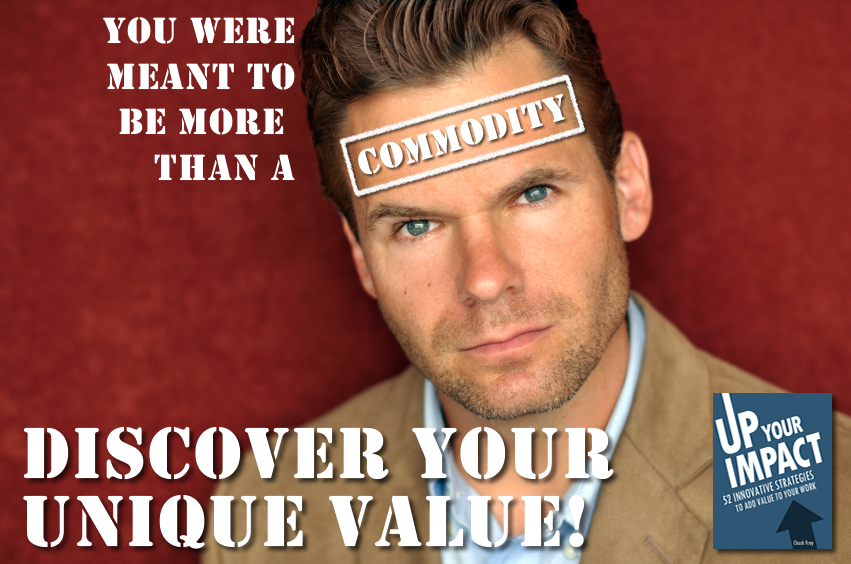How can you tell if you have become a commodity – a “me-too” worker who is indistinguishable from your peers? After all, no one will ever TELL you that you’ve made the transition into boring sameness. And, more importantly, what steps can you take to become a more valued thought leader?
Here are some tell-tale signs that you’re dangerously close to becoming a commodity in the minds of your boss and other people who can influence your career:
Where are your ideas? When is the last time you have suggested ideas for improving the efficiency of your work, your team or your department? What about new ideas for products, services or business models? If you haven’t done so lately, you’re a commodity – just another battle-scarred survivor of downsizings and re-orgs who is silently soldiering on, just doing what they’re told. Peak performers are always thinking about ideas and improvements, and share the best of them with their employer.
Low level of participation in meetings: Are you sharing ideas and opinions in meetings? Or are you a lurker – a silent participant? If you’re quiet, your boss will assume that you’re disinterested or have nothing of value to offer. Make your ideas heard – either during the meeting or in a follow-up email. You want to demonstrate to those in power that you’re thinking deeply and critically about ways to grow the business!
Problematic annual reviews: What is the tone and tenor of your annual review with your boss? Do you get the sense that he or she thinks you have plateaued? What are the consequences if you don’t address his or her concerns?
Promotions and special projects pass you by: Do you tend to get overlooked for promotions and special projects? This is strongly tied to the last point. If your boss is telling you that there are some lingering problems with your performance, chances are excellent that you’re NOT on anyone’s short list of candidates for a promotion or special project.
Have you lost your passion and motivation? What is your motivation for what you do? Does that come through clearly in your personality and your work? Or has it gotten beaten out of you by your current work environment? Many executives are still shell-shocked by the prolonged downturn. This makes it even easier to stand out, by caring more and working harder and smarter than your peers think is necessary. “Good enough” isn’t good enough for you. Make sure your boss and other senior-level executives in your firm can clearly see your passion and motivation for what you do.
How’s your personal brand? In today’s era of declining loyalty, career experts say one of the best moves you can make is to cultivate your personal brand. Ask several professional peers whom you trust and respect to describe you in 10 words or less – just a gut-level reaction. What would they say? Are their reactions well-aligned with the way you’d like to be perceived? If not, you’ve got some work to do!
How healthy is your professional network? How involved are you in any local professional groups in your field? What about LinkedIn groups related to your profession? Are you actively participating in conversations in these venues, acting as a thought leader or contributor, or are you just “lurking” in the background? Increase your visibility by being an active contributor to online and in-person discussions. Contribute your knowledge, experience and opinions where appropriate. This will elevate your image in the minds of your peers – and prospective employers.
Continuing education: What are you doing to further your professional knowledge? Have you recently taken any classes or attended any conferences in your field of work or a related area? If not, it’s time to get busy! If your company won’t pay for such classes and events, consider investing your own time and money in them. Yes, it’s THAT important. The days of a company taking charge of your professional development are over, a casualty of the recession. It’s up to you now. What’s your plan for your continuing education? If you have engaged in continuing education, make sure it’s reflected in your resume and LinkedIn profile, and that your boss is aware of it.
Communicate your unique value
If you’re not sending periodic e-mails to your boss and your internal network letting them know about your recent accomplishments, successes and the insights you’re learning, then they’re probably not even aware of these great things. Remember, they’re often in triage mode, doing the work of two or three people, just like you are. Don’t assume they know what you’ve accomplished – tell them. Also be sure to highlight these items in your resume and LinkedIn profile where appropriate.
LinkedIn provides free modules you can add to your profile to showcase continuing education, awards and other forms of professional recognition you’ve received, examples of presentations you’ve made, articles and papers you’ve had published and much more. Learn what these tools are and how to use them – they’re critically important to differentiating your LinkedIn profile!
So what are you waiting for? It’s time to uncover and communicate your unique value!

